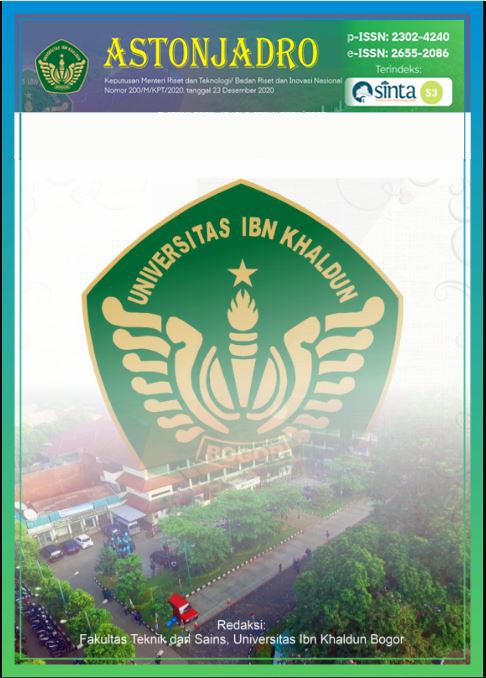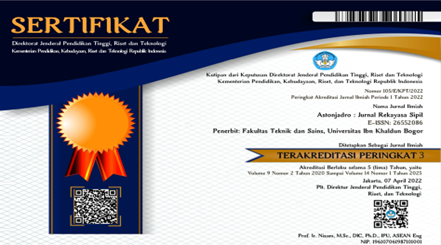Analysis of Electric Bus Utilization for Urban Transport using Bus Route, Passenger Demand and Fuel Consumptuion (Blok M-Kota Corridor Case)
DOI:
https://doi.org/10.32832/astonjadro.v12i3.8528Keywords:
electric bus, vehicle operating cost, comparison of electric bus, battery charging time, transjakarta.Abstract
Buses as a means of public transportation can greatly reduce traffic problems in urban areas through the use of, among other things, innovative techniques and technologies. The development of innovative technologies increasingly oriented towards the electrification of vehicle propulsion systems is expected to lead to the reduction of harmful emissions, increased vehicle efficiency, improved performance, reduced fuel consumption, and reduced noise. This study aims to determine the comparison of Transjakarta electric buses with conventional buses owned by Transjakarta, identify and evaluate the condition of the electric bus side. This study uses quantitative methods. The results of the study show a comparison of the operational cost calculation as indicated by the calculation of direct costs and indirect costs. The unit price for a bus/km for a diesel bus is Rp. 51,796, on the electric bus Rp. 224,991, and BBG buses for Rp. 82,227. where in the comparison of BOK diesel buses are cheaper than electric buses and CNG. The most expensive cost is the replacement of spare parts, especially the price of the battery which needs to be replaced every 10 years. 3,876, while bbg buses require much cheaper, which is Rp. 630. The calculation results of the electric bus battery consumption on the use of 1 route with a distance of 30.8 on weekdays on average 11.5% while on weekends it is 9.5%. At the kWh consumption, the electric bus requires the consumption of kWh per trip with a distance of 31.4 km is 23.57 kWh. From this value, it is known that the efficiency is 1.3 km/1 kWh. In charging the battery, the average battery charging time on the electric bus is 134 minutes or about 2.23 hours.References
Arifin AM, D Gemina, dan E Silaningsih. 2015. Analisis tingkat kepuasan penumpang pada fasilitas pelayanan bus transjakarta berbasis standar pelayanan minimal (SPM). Jurnal Sosial Humaniora, Vol.6. No.2.
Dewa, ANS, A.A. Rai Asmani, dan Luh KD. 2019. Analisis Tarif Berdasarkan Biaya Operasi Kendaraan (Bok) Pengoperasian Angkutan Antar Jemput (Carpooling) Bagi Siswa Sekolah Di Kota Denpasar. Jurnal Paduraksa: Vol 8 No 2
Elkhasnet, dan M Fathurrahman Al Rasyid. 2020. Analisis Biaya Operasional Kendaraan (BOK) Angkutan Kota Trayek Cimahi – Leuwipanjang Bandung” Jurusan Teknik Sipil Itenas No. 1Vol. 6
Director General of Land Transport Decree 687 of 2002 “concerning Technical Guidelines for the Implementation of Public Transport in Urban Areas on Fixed and Regular Routes”. Department of Transportation. Jakarta
Firdaus, S. K dan Muhammad, M, U, 2015. Analisis Teknologi Charger Untuk Kendaraan Listrik. Jurnal Rekayasa Mesin Vol.6, No.3
Jürg Grütter and Ki-Joon Kim 2019. E-Mobility Options for ADB Developing Member Countries. Grütter Consulting AG
Jürg Grütter, 2014. Real World Performance of Hybrid and Electric Buses. Grütter Consulting AG
Luc P, Dirk De K, Hans Band Guido L 2001 “Influence of Vehicle Test Cycle Characteristics on Fuel Consumption and Emissions of City Buses.
Pierre R. H. 2010. Energy Use Analysis & Technology For Electric Transit Buses. University of Ontario Institute of Technology.
Raksodewanto, A. A 2020. Membandingkan Mobil Listrik Dengan Mobil Konvensional. Institut Teknologi Indonesia.
Prayudyanto, M, N. 2021. Perbandingan Kinerja Buy The Services Angkutan Umum Massal Kota Metropolitan dengan Metode Biaya Operasional Kendaraan dan Indeks Sustainabilitas. Jurnal Penelitian Transportasi Darat, Vol. 23, No.1.
Prayudyanto, M, N. 2021. Sustainability Index Assessment of Urban Transport Services in Developing Cities”. Jurnal Rekayasa Sipil ASTONJADRO, Vol. 10, No. 1.
Rianti, P. Y dan Tuti, R. 2017. Kualitas Pelayanan Transjakarta Busway Di Dki Jakarta. Vol. 15, No. 2.
Živanović, Z and Nikolić, Z. 2012. The Application of Electric Drive Technologies in City Buses. http://dx.doi.org/10.5772/51770
duniatambang.co.id/Berita/read/1597/Sumber-Energi-Berlimpah-Indonesia-Punya-cadangan-Nikel-Terbesar-di-Dunia
S Syaiful, P Pratikso, SW Mudjanarko, 2023. Literature Study of the Sustainability Model of Transportation Facilities and Infrastructure in the Management of Public Transportation with the Concept of Inter-Regional Cooperation (Case in the City and District of Bogor). ASTONJADRO 12 (2), 613-634.
S Syaiful, H Siregar, E Rustiadi, ES Hariyadi. (2022). Performance of Three Arms Signalized Intersection at Salabenda in Bogor Regency, ASTONJADRO, 11(1), pp.13-29.
S Syaiful, H Siregar, E Rustiadi, ES Hariyadi. 2021. Traffic Improvement Strategy in Transportation System Using AHP Method. ARPN Journal of Engineering and Applied Sciences 16 (22), 2431-2439.
Downloads
Published
How to Cite
Issue
Section
License
Copyright (c) 2023 ASTONJADRO

This work is licensed under a Creative Commons Attribution-ShareAlike 4.0 International License.
Paper submitted to ASTONJADRO is the sole property of the Astonjadro Journal. Unless the author withdraws the paper because he does not want to be published in this journal. The publication rights are in the journal Astonjadro.ASTONJADRO
LICENSE
This work is licensed under a Creative Commons Attribution-ShareAlike 4.0 International License.
Based on a work at http://ejournal.uika-bogor.ac.id/index.php/ASTONJADRO













